- Home
- Tony Hillerman
Skeleton Man Page 2
Skeleton Man Read online
Page 2
“Not a thing. If I had known he’d put it on his insurance claim, I would have asked him. I’d have said, ‘Mr. McGinnis, how did you come to have such a fancy diamond?’ and McGinnis would have said, ‘Officer Leaphorn, that’s none of your damned business.’”
Pinto waited for an expansion of that. Leaphorn let him wait. “No ideas, then?”
“Not a one. But now I have a question for you. None of my damned business either, but it seems to me our federal friends are unusually interested in this diamond. I’ll bet you noticed that, too, and you asked whichever special agent is dealing with this about it. What did he say?”
Captain Pinto smiled, and it turned into a laugh. “Ah, hell, Joe,” he said. “It was George Rice. He said it was just routine, and I said, ‘Come on now, Special Agent Rice, you can be honest with me,’ and he said, ‘Well, you know how it’s been since the politicians invented that Homeland Security Agency. They laid a fat new level of political patronage bureaucrats on top of everything we already had to deal with.’ Rice said he had a feeling maybe one of the campaign fund-raisers in Washington was doing somebody a favor. You know how it works. Called the regional jefe in Phoenix on the old buddy-buddy basis and told him somebody in the White House would be happy to hear anything we could find out about where this diamond came from. And I told Rice that sounds mysterious, and he said he had the impression it has something to do with a huge estate settlement lawsuit going on back there, and I said that’s mysterious, too, and he said it was also a mystery to him, and since it sounded like more Washington politics to him, he’d be happy to keep it that way.”
Leaphorn considered this a moment.
“Well,” he said, “that makes me sort of glad I’m retired. But why don’t you get somebody at work finding McGinnis’s family, or whoever claimed his body. They’d have his stuff, if anything was worth keeping. Maybe that would…” He stopped. Shook his head. “You know, I’m having trouble believing that old man has left us.”
“They say the good die young. But even men like Shorty have to go sometime.”
“How did it happen?”
“Just natural death. He was old as the mountains, wasn’t he?”
Leaphorn sat awhile, staring out the window. Shook his head. “Hard to believe old Shorty just died naturally,” he said. “Wasn’t shot or something.”
“Well, we never heard anything to the contrary,” Pinto said.
Leaphorn got up, recovered his hat.
“Well, I’m sorry I couldn’t be more helpful,” he said. “And if I happen to learn anything about the McGinnis diamond, I’ll let you know. But I’m not going to lose any sleep over it.”
Which, of course, proved to be wrong.
3
The text of the message on Joanna Craig’s answering machine didn’t seem very important. But the tone of her lawyer’s voice told her it was.
“Miss Craig,” he had said. “This is Hal Simmons. Our investigators have notified me of something that I should discuss with you. I’ll be in my office all afternoon. Please call me when you have time.”
She had hardly spoken to Simmons since they’d completed the legal work after her mother’s funeral. Now she found his law firm’s number in the telephone book, got a busy signal, then called the apartment house doorman and asked him to get her a taxi.
The receptionist at the Simmons law office remembered her from the days when she was there a lot, trying to tie up all those loose ends that death leaves behind even well-organized people. And Joanna Craig’s mother was not organized at all. She was erratic, forgetful of things that had happened yesterday, remembering things that had never happened. “Senile dementia,” her psychiatrist had called it. Joanna had protested that her mother was too young for senility, and he had said, “Your mother’s been through a lot of stress. And her mind has always been—Well, better to say your mother has always had a mind of her own.”
However you phrased it, Joanna knew what caused it. It was the death of John Clarke, Joanna’s father, and the cruel treatment her mother had received from Clarke’s family. Her mother had rarely talked to her about it, and never without crying. But Joanna knew of the injustice. The way her mother had been treated must have been as painful as the loss of her lover. It certainly hurt her daughter.
It wasn’t the money, Joanna told herself. She didn’t need it. She was getting along fine without it, just as her mother had managed to. It was the cruelty of it. The contempt. That had been a wound that would never heal unless she could finally give her mother justice. And revenge. Maybe what Simmons would tell her would mean that would finally be possible.
He rose from the high-backed chair behind his battered old desk, smiling at her. A big, broad-shouldered man who her mother had told her she could always trust. And she did.
“Miss Craig,” he said. “Have a seat. Get comfortable. Explaining this will take a while. I don’t want you to expect too much out of what I’m going to tell. But at least it seems to me to represent a chance.”
Joanna felt suddenly weak.
“A chance?”
“One of those diamonds seems to have turned up.”
She sat down. Closed her eyes.
“Are you all right?” Simmons buzzed his secretary, ordered a glass of water.
“Just the diamonds?” Joanna said, in a voice almost too faint to be heard.
Simmons peered at her. Took the water glass from his secretary and presented it to Joanna, who was looking out the window at the busy streets, at the gray, overcast sky, at the traffic rolling below.
“Remember how your father carried those diamonds, padlocked to his wrist in that special carrying case your mother told you about? It seems to me that finding them…” Simmons paused, looking for a way to put this. “Well, that may finally give us a chance to find his bones. And we’ve heard a little more about that, too. Just a collection of rumors, perhaps. But…”
“Yes,” Joanna said. She sat up and straightened her blouse collar. “Tell me everything you’ve heard. Tell me what you think we should do next.”
Simmons tilted back in his chair, took off his glasses, rubbed his eyes, replaced the spectacles, and studied her thoughtfully.
“As friend of your mother, or as lawyer?”
Joanna considered that.
“As lawyer,” she said. “Not that you haven’t been a good friend.”
Simmons sighed. “As friend, I would remind you that you are getting along very well. Good job, and I think the funds your mother left you were always well invested. So you could buy diamonds if you want them and you don’t need to make yourself a multi-multimillionaire and start dealing with all the troubles that brings with it. Right?”
“Well, yes,” Joanna said. “But that’s not the point. It never has been the point.”
“I know,” Simmons said. “Your mother suffered a lot. And you’d like to see old Plymale pay for that. So would I. But Joann—”
Joanna Craig raised her hand, cut him off. “I’d like to see justice done. I’d like to see him burn in hell.”
Simmons considered that a moment, leaned forward.
“Then I’ll tell you that if you can find those bones—find anything from which your father’s DNA can be extracted—I think we can get your estate claim back into court. With that, and with the evidence in those letters your mother left you, we can establish legally that you are a direct descendant of John Clarke, and thus a direct descendant of Clarke’s father. Thereby you can reclaim the Clarke family estate. Thereby you can make Plymale suffer and, from what I’ve heard of how he has looted that foundation, make him do some burning in bankruptcy court, and probably criminal court as well.”
Joanna Craig smiled. “I guess it doesn’t sound very Christian. But I’d like that. In fact, I’d enjoy it immensely.”
Simmons considered that a moment, shrugged.
“The only way I know of to locate those bones is to find the person who found that container of diamonds. We know it was locked
to your father’s arm. Trace it back. For the first time that looks faintly possible. And knowing old Plymale, I must warn you that he will be well aware of that possibility. Probably losing sleep thinking about it. Planning what he can do to keep that from happening.”
Joanna Craig was still smiling.
“So you are saying go find them?”
“As your lawyer, yes. We’ll renew our contract with that investigations agency. I’ll keep you informed and advised.”
“How about as a friend?”
Hal Simmons shook his head.
“Joanna, as a friend of your mother, as your friend now, I’d say just go home and forget all this. Try to be happy. Even with this diamond showing up, the odds are very slim his body can be found after all these years. And hunting something Plymale doesn’t want you to find is sort of like hunting a crocodile in the crocodile’s own river.”
“Just tell me how to go about it. How to start.”
Simmons sighed. “Well, you’ll find the man who had the diamond in New Mexico. In the McKinley County jail in Gallup waiting to be indicted for murder. That’s where you’ll start.”
4
Bradford Chandler suddenly swiveled in his beach chair to keep the sea breeze out of his ear. The old bastard had finally said something interesting. Something about diamonds?
Chandler had let his mind wander away from this rambling conversation, just enjoying the feel of the sand blown against the bottom of his bare feet by the Caribbean wind, and the sensation of the sun on his legs, and the sight of the nicely tanned and very shapely girl strolling along the surf line clad in a string bikini and not much else. Thinking of her as prey. Thinking of himself as predator. Enjoying, too, just being here on this very private beach, and his memory of the polished limo pulling up beside the old bastard’s private jet with the big black driver holding the door open for him. Savoring the feel of luxury. Knowing that was the way fate intended it to be for Bradford Chandler. And that was the way it wasn’t. Not yet.
“Diamonds?” Chandler said. “You don’t expect diamonds in that part of the world. Where did they come from?”
“Mr. Chandler.” The old man’s tone was impatient now. “You haven’t been paying attention. My interest is in one diamond. If I knew where it came from, you wouldn’t be sitting in the shade here ogling one of my women.”
The old man was Dan Plymale, sitting in a recliner chair and sharing the shade of a huge beach umbrella just to Brad Chandler’s left, taking off his sunglasses now and staring at Chandler, his broad, tanned face stern, his hair and his eyebrows dead white, his eyes a pale and icy blue. Reminding Chandler of his deceased father. Bradford Churchill Chandler Sr. Plymale was another of their kind of people. Part of the Anglo-Saxon, Nordic ruling class. Or “we predator people,” as his dad would have proudly put it.
Chandler Senior had been deceased nine years now. But, alas, not deceased soon enough. He’d found time to change his will and cut Chandler out of it before he died.
“I just told you I need to know where that diamond came from,” Plymale was saying. “I’m ready to talk business now. Are you ready to listen?”
Chandler could not remember anyone ever speaking to him in that tone. He’d overheard it in a hundred luxury hotel lobbies, in the first-class sections of aircraft, and had used it himself sometimes, understanding it reflected the low regard of the luxury class for those below them. But he had never heard it directed at him.
“I was listening,” he said. “But you already told me you know where that particular diamond is. It’s being held as evidence by the cops in some dinky town in New Mexico. Right?”
“Wrong,” Plymale said. “I wasn’t asking where it is. I want to know where it came from.” Plymale sighed, took a sip from whatever he was drinking. Something iced. Slightly green. Certainly too expensive to be Chandler’s normal beverage these days. He loved the taste of such luxury on his tongue.
Plymale moved his bony old man’s hand over to a buzzer button on the table between them. Pressed it.
“Bring me another one, and one of whatever my guest is drinking.”
Then he leaned back, slipped a folder out of the briefcase on the table, and began leafing through its contents, glancing over at Chandler now and then, sometimes frowning. The drinks arrived on a tray carried by a pretty young woman. No “thank you” came from Plymale, Chandler noticed. He didn’t even waste a receptive nod. The very model of Brad Chandler Sr.
“Time for business now. Time to tell you what you need to know. But first we’ll give a few minutes to this résumé of yours.”
“Résumé?” Chandler said. “I didn’t send you—”
“Of course not,” Plymale said, looking at Brad quizzically. “That’s not the way anyone intelligent collects a résumé. You get it from people who know the subject. People you can trust.”
“Oh,” said Chandler.
“Like this,” Plymale said. “Right here it says—Well, I won’t read that. About you getting arrested at a ski resort in Switzerland. Drunk, disorderly, and physical assault on a security type.” He looked up from the page, eyebrows raised. “Would you have put that in?”
“No.”
“It says, ‘Chandler bought out of that.’ That right?”
“Right.”
“Which Chandler? Is that you or your daddy?”
“Well, I handled it,” Chandler said.
“How much did it cost?”
“Let’s see. I think it was ten thousand Swiss francs to the guy I hit. And then something to the guy who arranged the payoff.”
“Your daddy’s money?”
“Sure,” Chandler said. He was beginning to resent this.
Plymale switched to another page.
“Bennington,” Plymale said. “Three years there. Looks like you made good connections.” He read some more. “Looks like some really good connections.” He chuckled. “But not good grades. Not wasting your time on the books. The smart boys know why Dad’s getting them into those exclusive ruling-class places. Gets ’em connected with the important money. If they like to read books, they can read lots of books later.”
“Yeah,” Chandler said. Cool now. Smiling at Plymale.
“Didn’t work out too well for you, though, did it?”
“Who knows,” Chandler said. “It may.”
Plymale was on another page now.
“Skippers Incorporated,” he said. “Why call it that?”
“They’re our business. Hunting down the bail bond skippers, the white-collar thieves. Losers like that. Finding them. Bringing ’em in. Collecting the reward. The bounty.”
Plymale indicated what he’d been reading with his finger. “This how you made the connection with Skippers? This affair here where the judge in Portland set your bond at a hundred thousand on that criminal assault charge? Did you skip out on that? It’s not clear about that.”
“I didn’t skip,” Chandler said, suddenly nervous and noticing it must have sounded in his voice. He canceled it with a laugh. It was clear enough now, as he’d always suspected, that Plymale hadn’t picked him for his good citizenship. He’d been hoping that whoever Plymale had hired to put together this probe into his life wouldn’t look too closely into that Portland incident. There was a homicide detective there who had been very interested in that affair. Sort of obsessive, in fact. Kept probing into it. Chandler shook his head. Forget that. But Plymale was staring at him, awaiting an explanation.
“I paid my ten-thousand fee for the bail bond,” he said. “I showed up for trial on time. I got the charges dismissed for lack of evidence. Skippers kept my ten-grand fee and didn’t get their bond forfeited. All concerned happy.”
Plymale was frowning. “Lack of evidence? It says here the victim suffered broken jaw, broken arm, broken ribs, multiple abrasions. That sounds like a lot of evidence.”
“He didn’t show up in court.”
“Why not?”
Chandler shrugged, glanced at Plymale.
/>
The old man was waiting, wanting an answer.
“I heard his health failed him,” Chandler said.
He waited for the next question, staring out at the surf, dealing with the tension. Plymale probably already knew why the bastard hadn’t shown up in court. Already knew Chandler was suspected of making sure he couldn’t. Making sure the body would never be found. Plymale would ask him, just to see what he’d say. He had an answer ready, but that question didn’t come.
“That’s when you went to work for Skippers?”
“That’s correct,” Chandler said, relaxing a little.
“They seem to like the way you go about your job.”
“They should. I’m good at it.”
“Unusual career, isn’t it? I mean for a prep-school boy—Exeter, wasn’t it? Who went on to Bennington. Aren’t you supposed to get yourself a bride out of the debutante class, a Wall Street job, put on somebody’s board of directors? Something that wouldn’t involve you in assault charges?”
Chandler produced a yawn, covered it, said, “I guess so.” Sounding slightly bored. Feeling the tension easing.
“You like this work?”
“Yep,” Chandler said. “Not many dull moments finding these bond skippers. It gives you a chance to exercise your wits. Most of them don’t want to be found.”
“I noticed that,” Plymale said. “I noticed two cases in here involving some shooting.”
“Yeah,” Chandler said, confident now that this must have been what made him attractive to Plymale. “They shoot and miss, and you shoot and hit,” he said. “Otherwise the system isn’t efficient.”
He glanced at Plymale and found him staring back at him.
“And, both times, the police cleared you.”
“Of course,” Chandler said. “That’s the way it works. You get yourself deputized where you can. Anyway, you’re working as a law enforcer, and it’s self-defense, and the cops know you just saved them a lot of work and the cost of the trial by shooting the guy. You’re doing their job for them. Working off one of their undelivered warrants.”

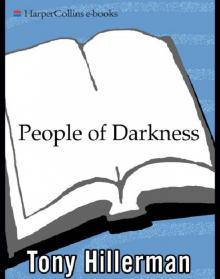 People of Darkness
People of Darkness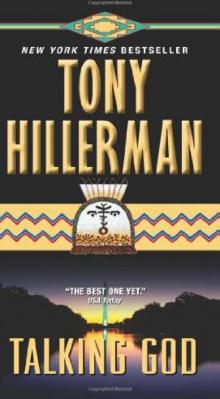 Talking God jlajc-9
Talking God jlajc-9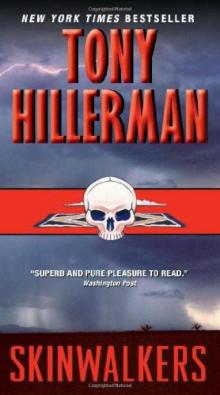 Skinwalkers jlajc-7
Skinwalkers jlajc-7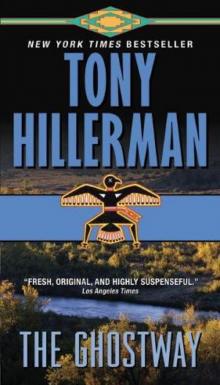 The Ghostway jlajc-6
The Ghostway jlajc-6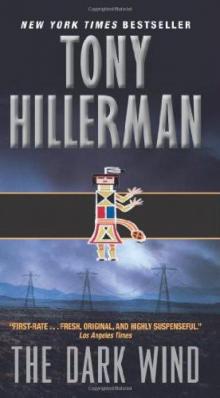 The Dark Wind jlajc-5
The Dark Wind jlajc-5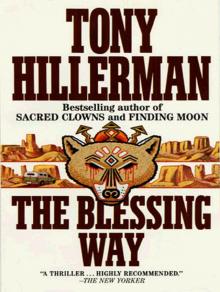 The Blessing Way
The Blessing Way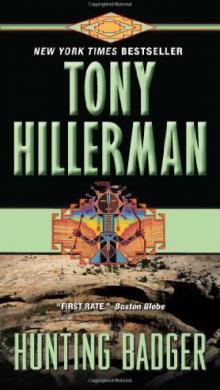 Hunting Badger jlajc-14
Hunting Badger jlajc-14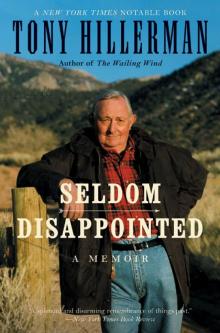 Seldom Disappointed: A Memoir
Seldom Disappointed: A Memoir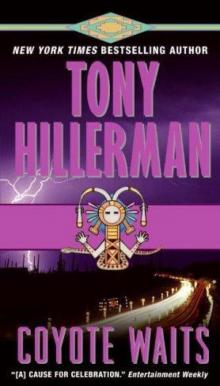 Coyote Waits jlajc-10
Coyote Waits jlajc-10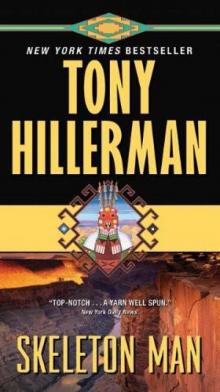 Skeleton Man jlajc-17
Skeleton Man jlajc-17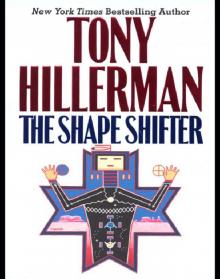 The Shape Shifter
The Shape Shifter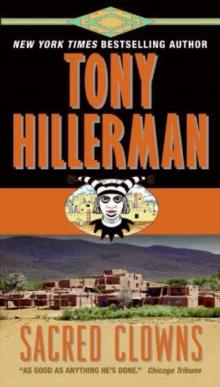 Sacred Clowns jlajc-11
Sacred Clowns jlajc-11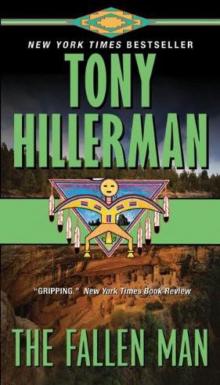 The Fallen Man jlajc-12
The Fallen Man jlajc-12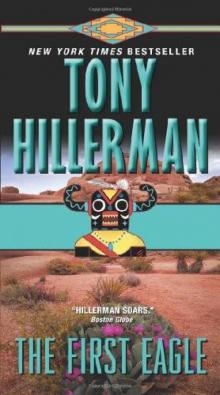 The First Eagle jlajc-13
The First Eagle jlajc-13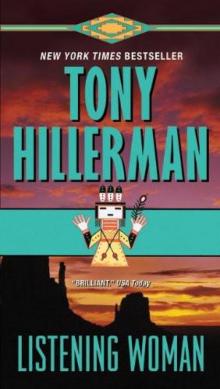 Listening Woman jlajc-3
Listening Woman jlajc-3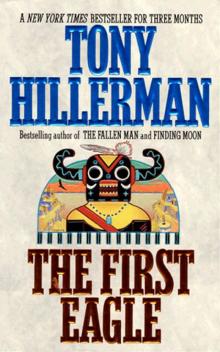 The First Eagle
The First Eagle Skeleton Man
Skeleton Man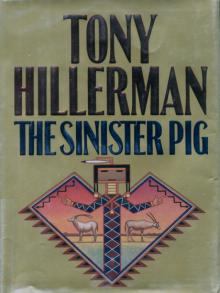 The Sinister Pig jlajc-16
The Sinister Pig jlajc-16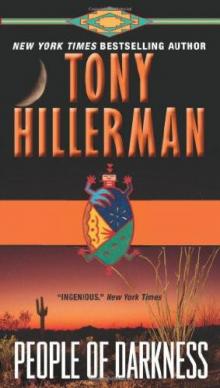 People of Darkness jlajc-4
People of Darkness jlajc-4 The Blessing Way jlajc-1
The Blessing Way jlajc-1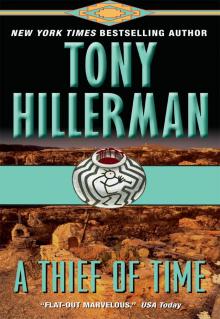 A Thief of Time
A Thief of Time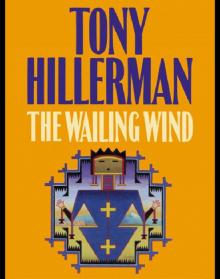 The Wailing Wind
The Wailing Wind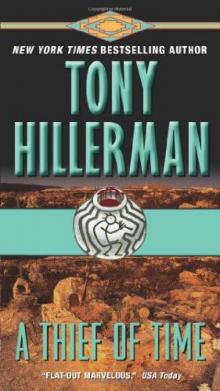 A Thief of Time jlajc-8
A Thief of Time jlajc-8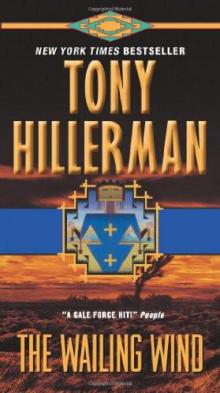 The Wailing Wind jlajc-15
The Wailing Wind jlajc-15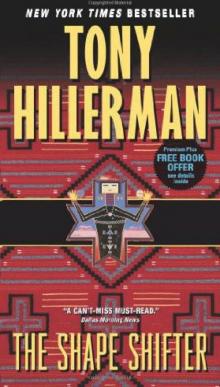 The Shape Shifter jlajc-18
The Shape Shifter jlajc-18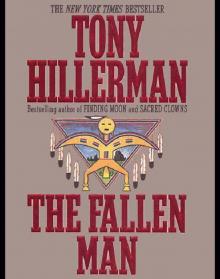 The Fallen Man
The Fallen Man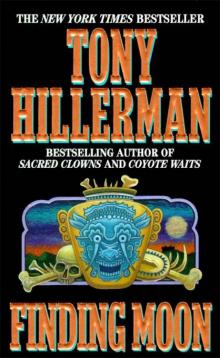 Finding Moon
Finding Moon